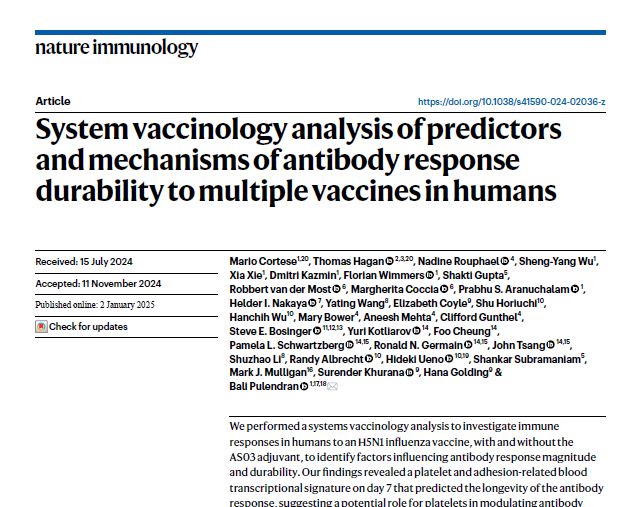System vaccinology analysis of predictors and mechanisms of antibody response durability to multiple vaccines in humans.
We performed a systems vaccinology analysis to investigate immune responses in humans to an H5N1 influenza vaccine, with and without the AS03 adjuvant, to identify factors influencing antibody response magnitude and durability. Our findings revealed a platelet and adhesion-related blood transcriptional signature on day 7 that predicted the longevity of the antibody response, suggesting a potential role for platelets in modulating antibody response durability. As platelets originate from megakaryocytes, we explored the effect of thrombopoietin (TPO)-mediated megakaryocyte activation on antibody response longevity. We found that TPO administration enhanced the durability of vaccine-induced antibody responses. TPO-activated megakaryocytes also promoted survival of human bone-marrow plasma cells through integrin β1/β2-mediated cell-cell interactions, along with survival factors APRIL and the MIF-CD74 axis. Using machine learning, we developed a classifier based on this platelet-associated signature, which predicted antibody response longevity across six vaccines from seven independent trials, highlighting a conserved mechanism for vaccine durability.
Authors
Cortese M, Hagan T, Rouphael N, Wu SY, Xie X, Kazmin D, et al.
External link
Publication Year
Publication Journal
Associeted Project
Systems Vaccinology
Lista de serviços
-
Is the gut microbiome key to modulating vaccine efficacy?Is the gut microbiome key to modulating vaccine efficacy?
-
Toxicogenomic and bioinformatics platforms to identify key molecular mechanisms of a curcumin-analogue DM-1 toxicity in melanoma cells.Toxicogenomic and bioinformatics platforms to identify key molecular mechanisms of a curcumin-analogue DM-1 toxicity in melanoma cells.

